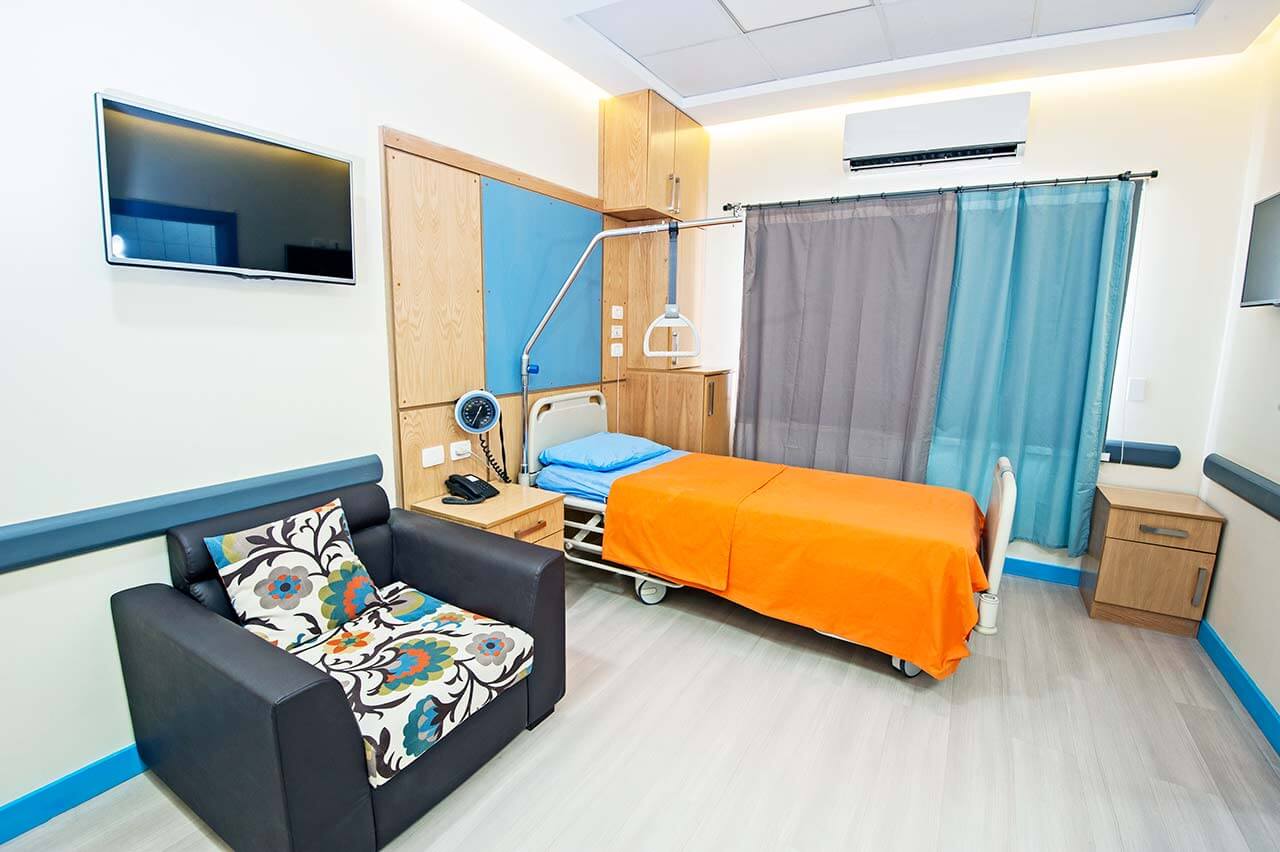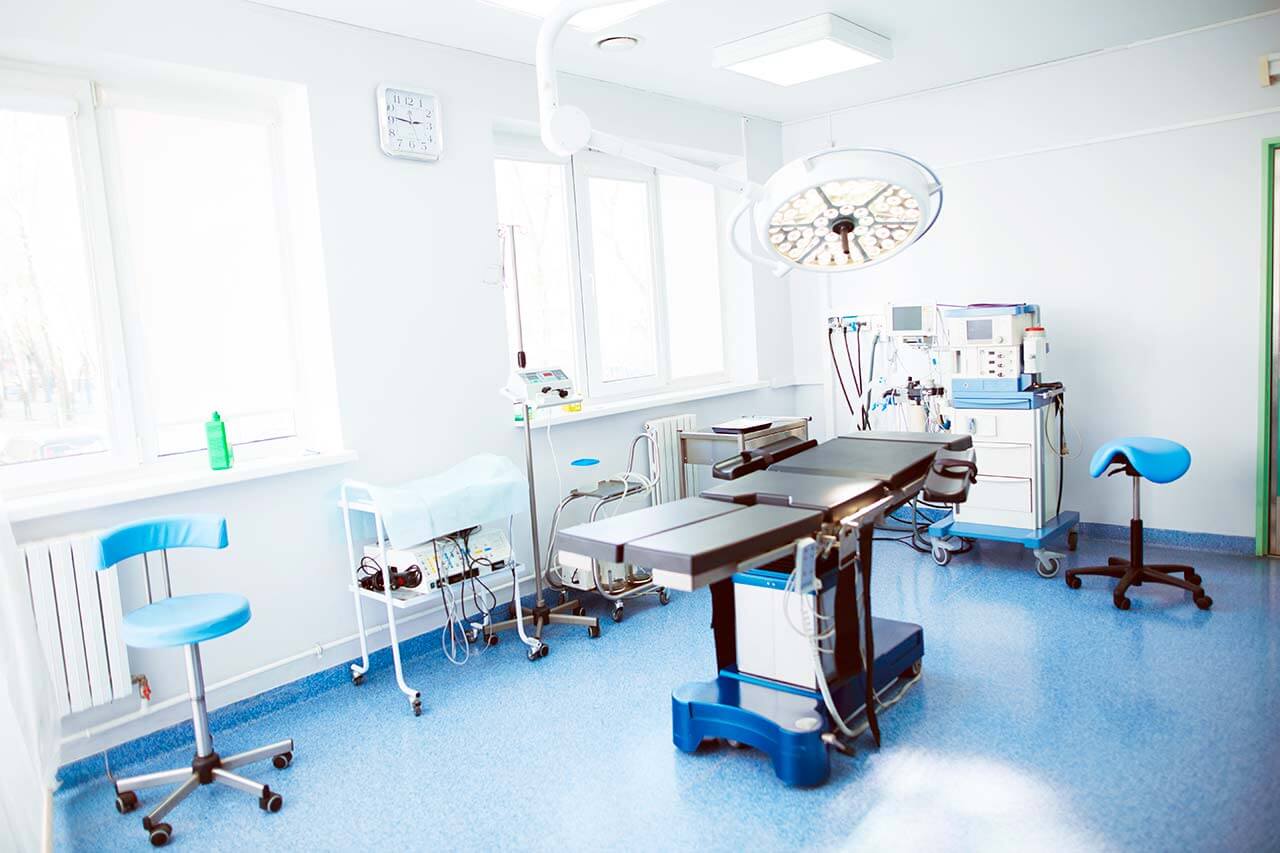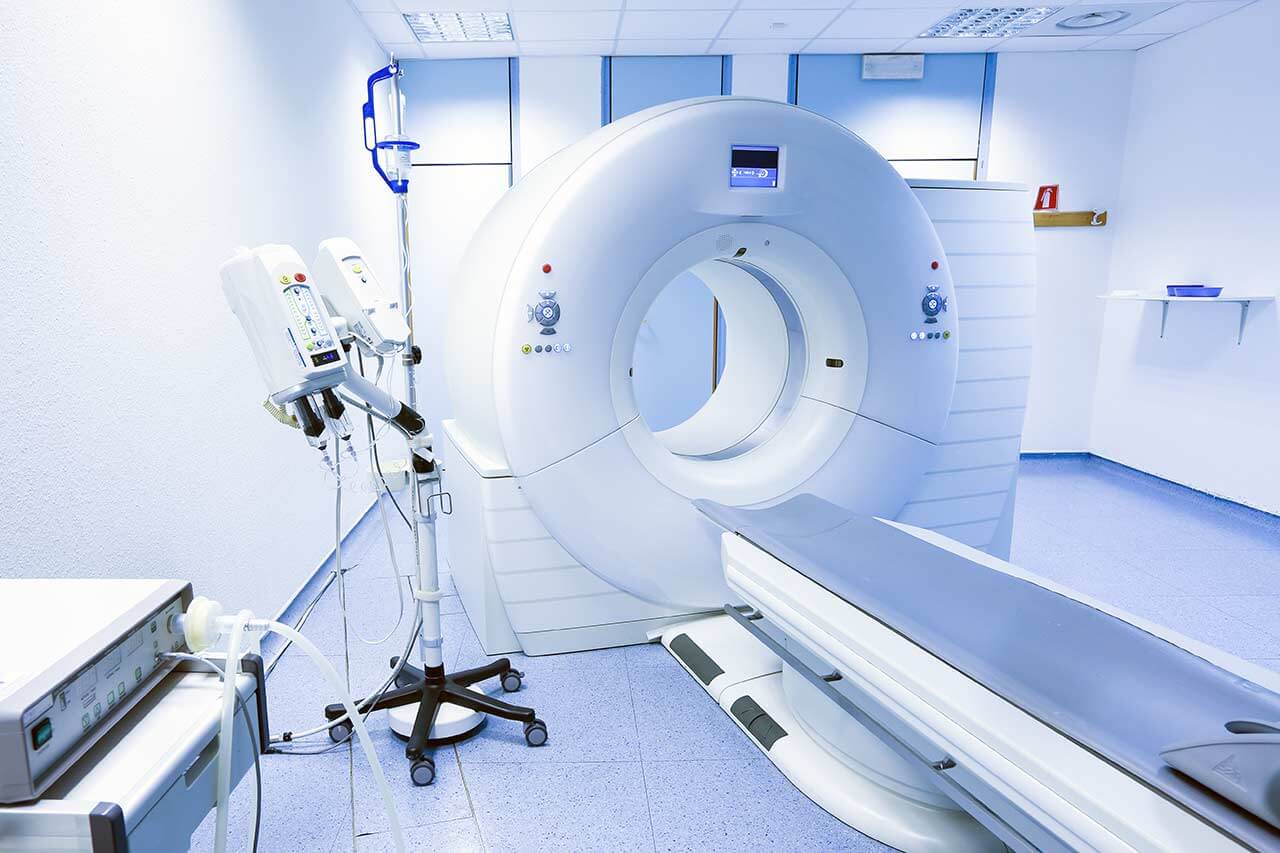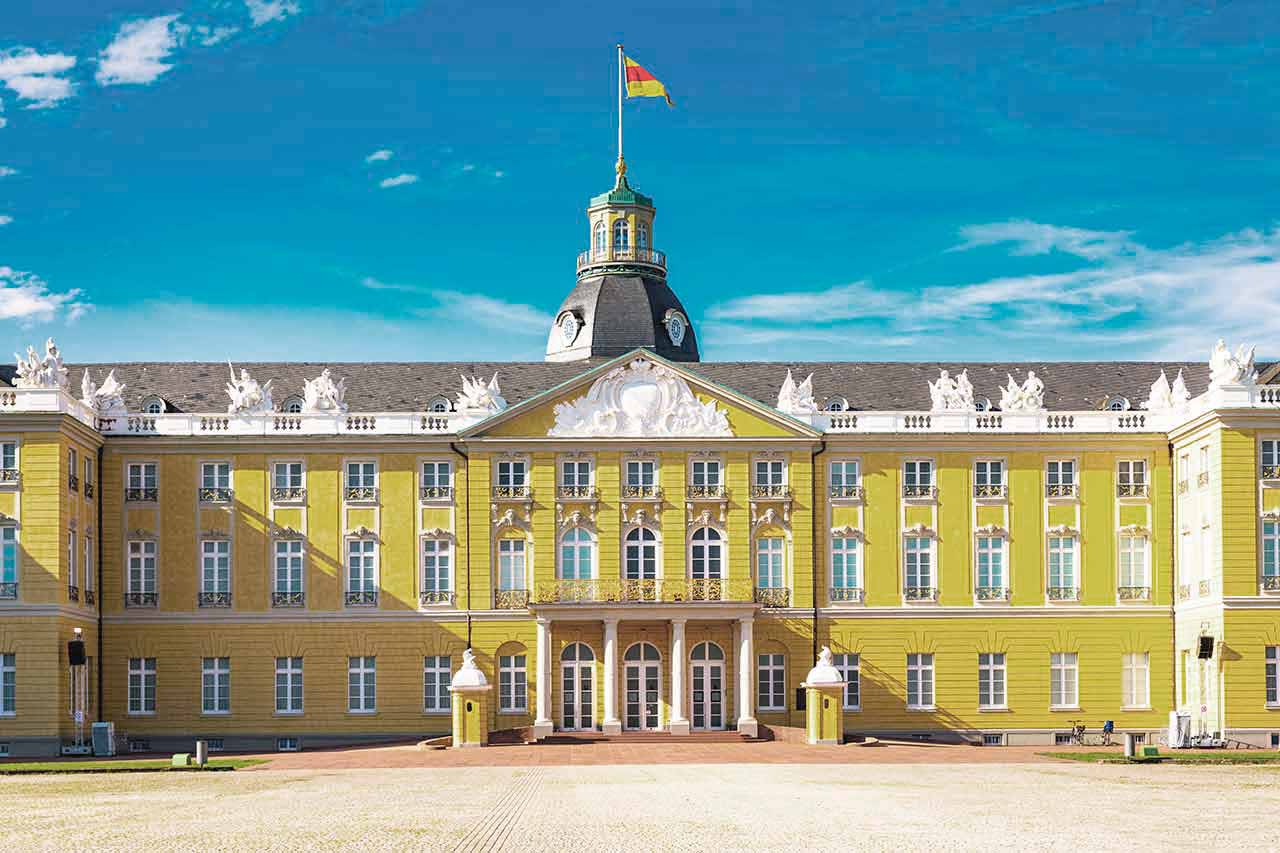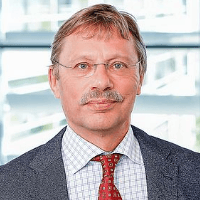
The program includes:
- Initial presentation in the clinic
- case history collection
- general clinical examination
- laboratory tests:
- complete blood count
- general urine analysis
- biochemical analysis of blood
- TSH-basal, fT3, fT4
- tumor markers (thyroglobulin (TG),
TG antibodies (TgAb)) - indicators of inflammation
- indicators of blood coagulation
- ultrasound scan of the thyroid gland
- thyroid scintigraphy
- radioiodine therapy
- symptomatic treatment
- cost of essential medicines
- nursing services
- stay in the hospital with full board in 2-bed room
- elaboration of further recommendations
How program is carried out
During the first visit, the doctor will conduct a clinical examination and go through the results of the available diagnostic tests. After that, you will undergo the necessary additional examination, such as the assessment of liver and kidney function, ultrasound scan of the thyroid gland and lymph nodes of the neck, thyroid scintigraphy. This will allow your doctor to assess how effective radioiodine therapy will be and how well you will tolerate it. In addition, the doctor will calculate the dosage of the drug you need.
Radioiodine therapy with I-131 includes oral administration of the drug. You will take 1 to 4 radioactive iodine capsules or drink about a teaspoon of liquid with radioactive iodine. You will take the drug in your ward, without visiting the manipulation room or operating room.
After taking radioactive iodine, you will stay in your ward for 24 to 48 hours. The next morning after the procedure, the dosimetrist will determine the amount of radiation in your body. If the amount is low, you will be allowed to leave your ward and will be discharged from the hospital. If the amount is high, then the dosimetric control will continue for another day, until a low amount of radiation in your body is detected.
The isotope I-131 can accumulate not only in the thyroid gland, but also partially in the salivary glands. This can cause dry mouth. To get rid of this side effect, you will dissolve sour candies, as this stimulates the work of salivary glands.
The drug is quickly excreted by the kidneys, and after 48 hours you will no longer pose a danger to others. After the procedure, you should drink at least 1 glass of water per hour and visit the toilet regularly. This will allow you to quickly remove radioactive iodine from the body. Food can be usual, without excess iodine in the diet.
During these 48 hours, you can read, use a mobile phone, tablet or computer. All these devices will not be a source of radiation in the future.
Control examination includes scintigraphy, which is performed 7-10 days after radioiodine therapy. Based on the results of the examination, the doctor will determine how well the cells of the thyroid gland (or cancer metastases) have accumulated radioactive iodine. In a few weeks after the procedure, you will have a control blood test for thyroid hormones. In the future, you will visit an endocrinologist regularly.
Required documents
- Medical records
- MRI/CT scan (not older than 3 months)
- Biopsy results (if available)
Service
You may also book:
 BookingHealth Price from:
BookingHealth Price from:
About the department
The Department of Nuclear Medicine at the Municipal Hospital Karlsruhe provides the full range of diagnostic and therapeutic services in the area of its specialization. The department's doctors successfully carry out modern procedures using radionuclide pharmaceuticals. In the field of diagnostics, particular attention is paid to scintigraphy, PET, PET/CT, SPECT and SPECT/CT scans. The department’s therapeutic unit is designed for 7 beds and offers radioiodine therapy for benign and malignant thyroid diseases, peptide receptor radionuclide therapy with somatostatin analogues for neuroendocrine tumors, Lu-177 PSMA therapy for metastatic prostate cancer, selective internal radiation therapy with Y-90 labeled microspheres for primary liver tumors and liver metastases, as well as palliative treatment for symptomatic bone metastases. The department's specialists cooperate closely with the doctors from many other departments of the hospital. Medical care can be provided both on an inpatient and outpatient basis. The department strictly meets the requirements of radiation protection. The Head Physician of the department is Prof. Dr. med. Klaus Tatsch.
In 2014, the department was renovated and its equipment was renewed as well. The medical facility has GE Discovery 710 PET/CT system, SPECT device with two gamma cameras with two heads for whole body imaging and cross-sectional imaging, GE Discovery 670 SPECT/CT device, a special gamma camera for thyroid scintigraphy, two ultrasound devices with the additional possibility of performing Doppler ultrasonography, including elastography, as well as measuring instruments for determining the activity of radiation and radiation protection. The department also has a specialized laboratory for quality control of radiopharmaceuticals used for both diagnostics and treatment. The department's doctors most often carry out diagnostic tests for oncological diseases, pathologies of the nervous system and cardiovascular system. Gamma cameras are used for scintigraphy of all organs of the human body.
The range of the department's therapeutic services includes all modern types of radionuclide treatment. One of the most popular therapeutic procedures in the department is radioiodine therapy, which is successfully used for the treatment of benign and malignant thyroid diseases. Radioiodine therapy is an absolutely painless conservative treatment method with high efficiency. During this treatment, a patient stays in the hospital and takes a radioisotope of iodine in the form of a capsule or liquid orally. Radioactive iodine enters the bloodstream and is taken up by thyroid cells. Radiation gradually destroys the pathological cells of the thyroid gland, due to which the therapeutic effect is achieved. The main advantages of radioiodine therapy are its high efficiency and safety. In addition, this type of treatment can be combined with other methods, including chemotherapy and/or thyroid surgery.
As of today, prostate cancer is one of the most common pathologies in men, so the department's doctors offer their patients Lu-177-PSMA therapy, which is an innovative and highly effective type of treatment for this pathology. The technique is used to treat metastatic prostate cancer. Before prescribing such a therapy, the attending physician accurately studies the results of the patient's examinations and carries out the necessary additional tests. Diagnostic data also serve to calculate the dosage of the drug and determine the duration of the treatment course. The Lu-177 PSMA radioisotope is injected intravenously, after which the patient stays in the hospital for 2-3 days. Doctors perform imaging tests to assess the distribution of Lutetium in the body and its accumulation in tumor cells, and also to monitor the patient's general condition. The next procedure for the injection of Lu-177 PSMA radioisotope is performed after 6-8 weeks. This treatment method has proven itself in modern medicine. This is safe, highly effective and practically does not cause any side effects.
The department also provides such treatments as peptide receptor radionuclide therapy with somatostatin analogues for neuroendocrine tumors, selective internal radiation therapy with Y-90 labeled microspheres for primary liver tumors and liver metastases, as well as palliative treatment for pain syndrome caused by bone metastases. Each of the above methods involves the intravenous injection of a certain radioisotope, which finds the pathological focus and destroys it with radiation. The specialists of the medical center take maximum responsibility in selecting a particular treatment and planning a course of therapy, ensuring that patients receive effective and safe therapeutic procedures in compliance with radiation protection standards.
The department's range of medical services includes:
- Diagnostic methods
- Positron emission tomography (PET)
- PET/CT
- Scintigraphy of all organs
- SPECT
- SPECT/CT
- Therapeutic methods
- Radioiodine therapy for benign and malignant thyroid diseases
- Peptide receptor radionuclide therapy with somatostatin analogues for neuroendocrine tumors
- Lu-177 PSMA therapy for metastatic prostate cancer
- Selective internal radiation therapy with Y-90 labeled microspheres for primary liver tumors and liver metastases
- Palliative treatment of pain syndrome caused by bone metastases
- Other diagnostic and therapeutic options
Curriculum vitae
Prof. Klaus Tatsch studied Human Medicine at Ludwig Maximilian University of Munich. After his doctorate in 1985, he began his training for board certification in Nuclear Medicine in the Section of Nuclear Medicine of the Department of Radiology, which he graduated in 1990. In 1994, Prof. Tatsch had his habilitation and was appointed as a Deputy Head of the Department of Nuclear Medicine. From 1996 to 2009, he taught as a Professor at Ludwig Maximilian University of Munich.
Since 2009, the doctor has headed the Department of Nuclear Medicine at the Municipal Hospital Karlsruhe. His research focuses include the diagnostics of brain diseases, oncological diagnostics using PET and PET/CT, and all innovative treatment techniques with the use of open radionuclides.
Prof. Tatsch is a member of national and international professional societies, for example, the European Association of Nuclear Medicine (EANM). He is a member of the scientific advisory board of the European Journal of Nuclear Medicine and Molecular Imaging and the Quarterly Journal of Nuclear Medicine. In addition, the doctor is a reviewer of other well-known international journals.
Photo of the doctor: (c) Städtische Klinikum Karlsruhe
About hospital
The Municipal Hospital Karlsruhe is a modern maximum care medical facility, which combines a long tradition and the advanced achievements of modern medicine. The hospital operates on the basis of the University of Freiburg, so scientific innovations in the field of diagnostics and treatment are continuously introduced into practice here. The hospital presents almost all areas of modern medicine, including many medical services for young patients.
A highly qualified and experienced team of more than 4,500 employees provides impeccable medical care. The medical facility has 1,571 beds for the hospitalization of its patients. The hospital admits more than 63,000 inpatients and about 186,000 outpatients annually. A large number of patients wishing to receive medical care in the hospital speak for themselves and are a confirmation of the exceptional service, as well as the effectiveness of the treatment provided.
The quality management system of the hospital's medical care is certified in accordance with the DIN EN ISO 9001 standards. Since 2016, the hospital has implemented a regular quality control in compliance with the strict standards of the Initiative Quality Medicine (IQM). In addition, almost all departments of the hospital have numerous certificates in their areas of specialization, including certificates from the German Cancer Society (DKG), the German Society for General and Visceral Surgery (DGAV), the German Cardiac Society (DGK), the German Diabetes Society (DDG), the German Society of Nephrology (DGN), the German Trauma Society (DGU), etc.
The main value of the hospital's staff is the health and satisfaction of their patients, so a respect and a humane attitude towards each patient remain priorities. The doctors and nursing staff support each patient in every possible way on their path to recovery. The specialists also strive to perform the most sparing, but at the same time the most effective and safe treatment.
Photo: (с) depositphotos
Accommodation in hospital
Patients rooms
The patients of the Municipal Hospital Karlsruhe live in cozy patient rooms with everything necessary for a comfortable stay. Standard patient room furnishing includes an automatically adjustable bed, a bedside table, a TV, and a telephone. The patient rooms have Wi-Fi. Each patient room also has an ensuite bathroom with a shower and a toilet.
The patient rooms in the pediatric departments are specially designed for children, so that young patients feel at home. Children can live in their patient room with one of their parents. There are also special playrooms designed for children.
Meals and Menus
The patients of the hospital are offered tasty and varied three meals a day: breakfast, lunch and dinner. The menu also features dietary meals. The kitchen staff will gladly accept all the individual wishes of patients.
The hospital also has a cozy cafe where one can have a tasty snack, drink tea, coffee and soft drinks.
Further details
Standard rooms include:
Religion
The hospital has two chapels that regularly host Protestant, Catholic, and Ecumenical worship services. A patient can watch the broadcast of the worship on TV channels in his own room, if desired.
Accompanying person
Your accompanying person may stay with you in your patient room or at the hotel of your choice during the inpatient program.
Hotel
You may stay at the hotel of your choice during the outpatient program. Our managers will support you for selecting the best option.
